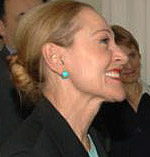There is still hope that Armenia will play a role in regional integration. At least that’s what the commissioner of the Foreign Relations and European Neighborhood Policy Benita Ferrero-Waldner said during a joint press conference with Foreign Minister of Armenia Vartan Oskanyan.
“We will not finance any project proposed by any country in the region if that doesn’t include Armenia.”
The OSCE former chairman visited Armenia for the first time since he was moved to another position. Mrs. Ferrero-Waldner plans on meeting with the three presidents of the Southern Caucasus and discuss the “prolonged conflicts” in the region, as well as the issues concerning energy security. According to Waldner, the European Union is not against the construction of the Armenia-Iran gas pipeline.
“The European Union is in favor of diversifying the energetic resources of Armenia,” said Ferrero-Waldner.
Besides that, the European Union will once again discuss the issue of Turkey opening the border with Armenia in order for Armenia to work with the European Union within the framework of the European Neighborhood Policy.
“This must be solved through negotiations,” said Ferrero-Waldner.
The Foreign Minister of Armenia Vartan Voskanyan is not filled with too much enthusiasm. During a press conference held yesterday, he said once again that Turkey doesn’t even want to open the border.
“We think that the European Union must lead negotiations with Turkey regarding opening the border because, after all, each member country of the European Union must have normal relations with neighboring countries,” said V. Oskanyan. “We don’t plan on changing our attitude towards Turkey.”
Despite the uncertainties after the Kocharyan-Aliev meeting in Rambuye, Benita Ferrero-Waldner still hasn’t lost hope and believes that the Karabagh conflict resolution may progress within the year 2006. Before her visit to Armenia, Ferrero-Waldner had announced in Baku that the European Union was ready to help lead the Karabagh conflict to a peaceful resolution.
“If they ask us for help, we will help,” she said yesterday without mentioning how they would do that.
According to Ferrero-Waldner, the European Union not only places emphasis on the participation of the co-chairmen, but also the proposals made to establish intimate ties between the conflicting sides. Vartan Oskanyan, in turn, said that Armenia has high expectations in that regard. According to the Foreign Minister of Armenia, the European Union can help Armenia both practically and theoretically. From the theoretical point of view, Oskanyan is of the opinion that if Armenia, Azerbaijan and Georgia integrate into European structures, progress in that field and have outlooks for European Union membership, the Karabagh conflict negotiations will be better. As for the practical help of the European Union, Vartan Oskanyan believes that the EU may help by providing security for the people of Karabagh, allocating peacekeeping forces, as well as returning the lands after the peace settlement.
“I think that the EU will help us a lot in the years to come. Armenia and Azerbaijan don’t trust each other and without that trust, it will be much more difficult to resolve the Karabagh conflict,” said the Foreign Minister of Armenia.
The European Union hopes that Iran’s nuclear weapon issue will be solved through diplomatic negotiations.
“Currently, the EU is leading negotiations with Iranian authorities. We hope that Iran will agree with the proposal made by Russia to use the nuclear heating in Russia’s region. We also hope that Iran will not isolate itself,” said commissioner of the EU Foreign Relations and European Neighborhood Policy Benita Ferrero Waldner:

